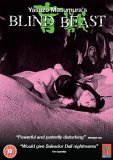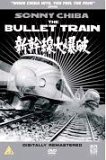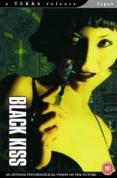![Graveyards of Honor [Blu-ray]](/pictures/1155619.jpg) Graveyards of Honor | Blu Ray | (31/05/2021)
from £14.99
| Saving you £N/A (N/A%)
| RRP
Graveyards of Honor | Blu Ray | (31/05/2021)
from £14.99
| Saving you £N/A (N/A%)
| RRP Two peerless masters of Japanese cinema Kinji Fukasaku (Battles without Honor and Humanity, Battle Royale) and Takashi Miike (Dead or Alive, Audition) present their own distinctive adaptations of yakuza expert Goro Fujita's gangster novel Graveyard of Honor, each tapping into the zeitgeist of a distinct period of Japanese history. Set during the turbulent post-war years, Fukasaku's original 1975 film charts the rise and fall of real-life gangster Rikio Ishikawa (Tetsuya Watari, Outlaw Gangster VIP). Shot through with the same stark realism and quasidocumentarian approach as Fukasaku's earlier Battles Without Honor and Humanity, Fukasaku nonetheless breaks new ground through his portrayal of a gangster utterly without honor or ethics, surviving by any means necessary in a world of brutal criminality. Meanwhile, Miike's 2002 retelling transplants the story to Tokyo at the turn of the millennium. Less a direct remake of Fukasaku's film than a radical reimagining of the same overarching premise, Miike's film captures both the hedonism and nihilism of the modern Japanese crime scene in deliriously stylish fashion, resulting in a fascinating companion piece to the original that nonetheless stands as its own entity. Arrow Video is proud to present these two intertwined but unique crime thrillers from two celebrated filmmakers at the peak of their creative powers. Special Features Two-disc set featuring two different versions of Graveyard of Honor, the 1975 film by Kinji Fukasaku and the 2002 film by Takashi Miike Special edition packaging featuring newly commissioned artwork by Ian MacEwan Reversible sleeves featuring original and newly commissioned artwork by Ian MacEwan DISC ONE GRAVEYARD OF HONOR (1975) High Definition Blu-ray⢠(1080p) presentation Original lossless Japanese PCM 1.0 mono soundtrack Optional English subtitles Audio commentary by author and critic Mark Schilling Like a Balloon: The Life of a Yakuza, a visual essay by critic and Projection Booth podcast host Mike White A Portrait of Rage, an archival appreciation of Fukasaku and his films, featuring interviews with filmmakers, scholars, and friends of the director On the Set with Fukasaku, an archival interview with assistant director Kenichi Oguri Theatrical trailer Imagery gallery DISC TWO GRAVEYARD OF HONOR (2002) High Definition Blu-ray⢠(1080p) presentation Original lossless Japanese PCM 2.0 stereo soundtrack Optional English subtitles Audio commentary by Miike biographer Tom Mes Men of Violence: The Male Driving Forces in Takashi Miike's Cinema, a visual essay by author and critic Kat Ellinger Archival interview special featuring Miike and cast members Goro Kishitani and Narimi Arimori Archival making-of featurette Archival making-of teaser Archival press release interviews featuring Miike, Kishitani and Arimori Archival premiere special featuring Miike, Kishitani and Arimori Theatrical trailer Imagery gallery
![Black Tight Killers [Blu-ray] [Region A & B]](/pictures/1168015.jpg) Black Tight Killers | Blu Ray | (24/03/2025)
from £12.99
| Saving you £N/A (N/A%)
| RRP
Black Tight Killers | Blu Ray | (24/03/2025)
from £12.99
| Saving you £N/A (N/A%)
| RRP After wooing stewardess Yoriko (Chieko Matsubara, Tokyo Drifter), war photographer Hondo (Akira Kobayashi, Battles Without Honor and Humanity) sees her kidnapped by a team of deadly female assassins who use vinyl records as weapons. Investigating her whereabouts, Hondo uncovers a conspiracy to steal a buried stash of WWII-era gold. Soon he must dodge go-go dancing ninjas and chewing-gum bullets to save Yoriko, whose family secret is tied to the hidden treasure. Every bit as stylish and inventive as the wildest works by his mentor Seijun Suzuki, Yasuharu Hasebe's spy spoof is a gaudy 1960s pop delight that ranks with the likes of Joseph Losey's Modesty Blaise and Mario Bava's Danger: Diabolik!
![Black Tight Killers (Limited Edition) [Blu-ray] [Region A & B]](/pictures/1164532.jpg) Black Tight Killers (Limited Edition) | Blu Ray | (26/02/2024)
from £17.98
| Saving you £N/A (N/A%)
| RRP
Black Tight Killers (Limited Edition) | Blu Ray | (26/02/2024)
from £17.98
| Saving you £N/A (N/A%)
| RRP After wooing stewardess Yoriko (Chieko Matsubara, Tokyo Drifter), war photographer Hondo (Akira Kobayashi, Battles Without Honor and Humanity) sees her kidnapped by a team of deadly female assassins who use vinyl records as weapons. Investigating her whereabouts, Hondo uncovers a conspiracy to steal a buried stash of WWII-era gold. Soon he must dodge go-go dancing ninjas and chewing-gum bullets to save Yoriko, whose family secret is tied to the hidden treasure. Every bit as stylish and inventive as the wildest works by his mentor Seijun Suzuki, Yasuharu Hasebe's spy spoof is a gaudy 1960s pop delight that ranks with the likes of Joseph Losey's Modesty Blaise and Mario Bava's Danger: Diabolik! Product Features High-Definition digital transfer Uncompressed mono PCM audio Audio commentary by Jasper Sharp Archival interview with director Yasuharu Hasebe Trailer Optional English subtitles Reversible sleeve featuring original and newly commissioned artwork by Time Tomorrow Limited edition booklet featuring new writing by Japanese cinema expert Chris D. Limited edition of 3000 copies, presented in full-height Scanavo packaging with removable OBI strip leaving packaging free of certificates and markings
![Blind Beast [Blu-ray]](/pictures/1155539.jpg) Blind Beast | Blu Ray | (23/08/2021)
from £16.39
| Saving you £N/A (N/A%)
| RRP
Blind Beast | Blu Ray | (23/08/2021)
from £16.39
| Saving you £N/A (N/A%)
| RRP Blind Beast is a grotesque portrait of the bizarre relationship between a blind sculptor and his captive muse, adapted from a short story from Japan's foremost master of the macabre, Edogawa Rampo (Horrors of Malformed Men, The Black Lizard, Caterpillar). An artist's model, Aki (Mako Midori), is abducted, and awakens in a dark warehouse studio whose walls are decorated with outsized women's body parts eyes, lips, legs and breasts and dominated by two recumbent giant statues of male and female nudes. Her kidnapper introduces himself as Michio (Eiji Funakoshi), a blind sculptor whom she had witnessed previously at an exhibition in which she featured intently caressing a statue of her naked torso. Michio announces his intention of using her to sculpt the perfect female form. At first defiant, she eventually succumbs to his intense fixation on her body and finds herself drawn into his sightless world, in which touch is everything. Blind Beast is a masterpiece of erotic horror that explores the all-encompassing and overwhelming relationship between the artist and his art and the obsessive closed world that the artist inhabits, with maestro director Yasuzo Masumura (Giants and Toys, Irezumi) conjuring up a hallucinogenic dreamworld in which sensual and creative urges combine with a feverish intensity. Special Features: High Definition Blu-ray (1080p) presentation Original uncompressed Japanese mono audio Optional English subtitles Brand new audio commentary by Asian cinema scholar Earl Jackson Newly filmed introduction by Japanese cinema expert Tony Rayns Blind Beast: Masumura the Supersensualist, a brand new visual essay by Japanese literature and visual studies scholar Seth Jacobowitz Original Trailer Image Gallery Reversible sleeve featuring original and newly commissioned artwork by Tony Stella FIRST PRESSING ONLY: Illustrated booklet featuring new writing by Virginie Sélavy.
 Blind Beast | DVD | (22/05/2006)
from £4.99
| Saving you £15.00 (300.60%)
| RRP
Blind Beast | DVD | (22/05/2006)
from £4.99
| Saving you £15.00 (300.60%)
| RRP A blind sculptor kidnaps an artist's model and imprisons her in his warehouse studio - a shadowland of perverse monuments to the female form. Here a deranged passion play of sensual and sexual obsession is acted out in a world where sight is replaced by touch... An intense exploration of perversion art and sado-masochism this incredible visually inventive tale of sex and madness power to a climax prefiguring Oshima's In The Realm Of The Sense (also known by its Japanese title
![New Battles Without Honour & Humanity [Limited Edition] [Blu-ray]](/pictures/1143480.jpg) New Battles Without Honour & Humanity | Blu Ray | (21/08/2017)
from £21.99
| Saving you £N/A (N/A%)
| RRP
New Battles Without Honour & Humanity | Blu Ray | (21/08/2017)
from £21.99
| Saving you £N/A (N/A%)
| RRP NEW BATTLES WITHOUT HOUNOUR AND HUMANITY: THE COMPLETE TRILOGY New Battles Without Honour and Humanity New Battles Without Honour and Humanity: The Boss's Head New Battles Without Honour and Humanity: Last Days of the Boss In the early 1970s Kinji Fukasaku's five-film Battles Without Honour and Humanity series was a massive hit in Japan and kicked off a boom in realistic modern yakuza films based on true stories. Although Fukasaku had intended to end the series Toei Studio convinced him to return to the director's chair for this unconnected follow-up trilogy of films each starring Battles leading man Bunta Sugawara and telling separate but fictional stories about the yakuza in different locations in Japan. In the first film Bunta Sugawara is Miyoshi a low-level assassin of the Yamamori gang who is sent to jail after a bungled hit. While in stir family member Aoki (Lone Wolf and Cub's Tomisaburo Wakayama) attempts to seize power from the boss and Miyoshi finds himself stuck between the two factions with no honourable way out. In the second entry The Boss's Head Sugawara is Kuroda an itinerant gambler who steps in when a hit by drug-addicted assassin Kusunoki (Tampopo's Tsutomu Yamazaki) goes wrong and takes the fall on behalf of the Owada family but when the gang fails to make good on financial promises to him Kuroda targets the family bosses with a ruthless vengeance. And in Last Days of the Boss Sugawara plays Nozaki a labourer who swears allegiance to a sympathetic crime boss only to find himself elected his successor after the boss is murdered. Restrained by a gang alliance that forbids retributions against high-level members Nozaki forms a plot to exact revenge on his rivals but a suspicious relationship with his own sister (Chieko Matsubara from Outlaw: Gangster VIP) taints his relationship with his fellow gang members. Making their English-language home video debut in this limited edition set the New Battles Without Honour and Humanity films are important links between the first half of Fukasaku's career and his later exploration of other genres. Each one is also a top-notch crime action thriller: hard-boiled entertaining and distinguished by Fukasaku's directorial genius funky musical scores by composer Toshiaki Tsushima and the onscreen power of Toei's greatest yakuza movie stars. LIMITED EDITION CONTENTS: High Definition digital transfers of all three films High Definition Blu-ray (1080p) and Standard Definition DVD presentations Original uncompressed mono audio New optional English subtitle translation for all three films Beyond the Films: New Battles Without Honour and Humanity a new video appreciation by Fukasaku biographer Sadao Yamane New Stories New Battles and Closing Stories two new interviews with screenwriter Koji Takada about his work on the second and third films in the trilogy Original theatrical trailers for all three films Reversible sleeve featuring original and newly commissioned artwork by Reinhard Kleist Illustrated collector's book featuring new writing on the films the yakuza genre and Fukasaku's career by Stephen Sarrazin Tom Mes Hayley Scanlon Chris D. and Marc Walkow
 Sonny Chiba Collection - Vol. 2 | DVD | (19/09/2005)
from £N/A
| Saving you £N/A (N/A%)
| RRP
Sonny Chiba Collection - Vol. 2 | DVD | (19/09/2005)
from £N/A
| Saving you £N/A (N/A%)
| RRP Three great films from the Japanese king of hardboiled ass-kicking Sonny Chiba! Timeslip (aka G.I. Samurai) (1979): A Japanese Army unit is mysteriously transported 400 years back in time to the warring states period of Japanese history and ends up facing an army of Samurai warriors... Golgo 13 (1973): Sonny Chiba stars as the underworld's no.1 hitman in this hardboiled action-packed adaptation of Japan's all-time bestselling manga... The Bullet Train (1975):
 The Bullet Train | DVD | (19/09/2005)
from £N/A
| Saving you £N/A (N/A%)
| RRP
The Bullet Train | DVD | (19/09/2005)
from £N/A
| Saving you £N/A (N/A%)
| RRP A madman (Ken Takakura) plants a bomb on one of Japan's prestigioss Shinkansen (bullet train) from Tokyo to Hakata the Hikari 109. Threatening to blow it up unless his demands are met if the train slows below 80km/h it will be destroyed. While the police try to track down the culprit it's up to a heroic train conductor (Sonny Chiba) to find the bomb and disarm it in time... Pre-dating ""Speed"" (and its Korean homage ""Tube"") by almost two decades ""Bullet Train"" is gripping edge of
 Black Kiss | DVD | (21/05/2007)
from £N/A
| Saving you £N/A (N/A%)
| RRP
Black Kiss | DVD | (21/05/2007)
from £N/A
| Saving you £N/A (N/A%)
| RRP Several producers and models from the entertainment industry are being killed one after another. The methods of murder are extremely atrocious and the dead bodies are decorated in an almost artistic manner. At the scene of each crime the perpetrator leaves a black lip print: who will be the next victim of the slayer in the deep darkness of Shinjuku?

Please wait. Loading...
This site uses cookies.
More details in our privacy policy